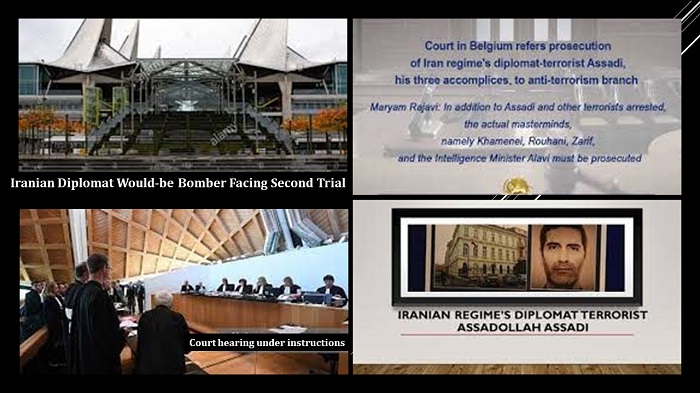
The court of hearing in Antwerp: The charge against Assadollah Assadi Iranian Diplomat is one of terrorism.
Assadollah Assadi, the Iranian diplomat who was arrested attempting to organize the bombing of the NCRI’s Free Iran summit in July 2018 in Paris is now facing his second court appearance in Belgium.
The accused has absented himself from the court hearing under instructions from the Iranian regime. Three other defendants, 2 who are Iranian / Belgian dual citizens and another Iranian are also facing trial for their involvement in the failed bombing plot.
.@StateDept: "Since 2018, Asadollah Asadi, who had been assigned as an Iranian diplomat to Austria, remains in a Belgian prison awaiting trial based on evidence that he provided explosives to bomb a dissident rally in Paris, which could have killed scores of men, women&children." https://t.co/chmchn82QA
— Alireza Jafarzadeh (@A_Jafarzadeh) June 8, 2020
Assadi used his role as a diplomat in Vienna, Austria as a cover to supervise intelligence activity across Europe. One of the priorities of the regime’s intelligence ministry is to monitor and disrupt any activity by supporters or members of the People’s Mojahedin Organization of Iran (PMOI / MEK Iran).
The charge against Assadi is one of terrorism. He is accused of supplying explosives to the Iranian / Belgian couple to use to blow up the Free Iran Summit in Paris.
The regime in Iran has done its best to put pressure on European authorities to drop charges against Assadi. Whatever they have tried hasn’t worked. The regime is now doing the opposite, so little news about the trial leaks through to Iranian citizens.
The regime was outraged that the MEK had relocated to Albania and that support for the organization internationally was growing. The potential advantage of assassinating the NCRI’s president-elect, Maryam Rajavi, and other key figures in the organization outweighed the risk of its diplomat in Vienna being arrested.
At the July 2020 Free Iran Summit, Mrs. Maryam Rajavi the President-elect of the National Council of Resistance of Iran’s (NCRI), pointed out that although the trial of the four terrorists in Belgium was a necessity, the real instigators of the bombing plot were nine other than Iran’s Supreme Leader, Ali Khamenei, its president, Hassan Rouhani and Mahmoud Alavi, the regime’s Intelligence Minister.
The #FreeIran2020 Global Summit at Ashraf 3 was the voice of the largest organized resistance in #Iran’s history, with the roaring river of its martyrs’ blood, echoing the calls for the clerical regime’s overthrow during successive uprisings from December 2017 to January 2020. pic.twitter.com/FJpQcrVF77
— Maryam Rajavi (@Maryam_Rajavi) July 24, 2020
Political leaders at the Free Iran Global Summit claimed that the failed plot in 2018 was a sign that the regime was running scared of the NCRI and MEK’s influence. They stated that the use of a diplomat in Vienna highlighted the fact that Iran was misusing its embassies and consulates around the world and governments should be encouraged to close these offices down.
In addition to the court hearing in Antwerp, the U.N. is coincidentally debating an extension of the arms embargo against the Iranian regime. The debate is due to take place in a couple of months’ time. It is likely that the result of the trial of an Iranian diplomat accused of plotting to blow up thousands of people, including foreign dignitaries, will have considerable bearing on the decision to extend the embargo.
As the U.S. Secretary of State, Mike Pompeo, said on June 30th, “given the Iranian regime’s history of resorting to terrorism and violence, perhaps we should take this threat seriously. Iran will be free to purchase new and advanced technologies for its proxies and partners throughout the Middle East, including Hamas, Hizballah, and the Houthis. We see the Islamic Republic of Iran for what it is: an aggressor, not a victim. Since May of 2018, we’ve slashed the vital oil revenues the regime uses for terrorism and illegal nuclear activities by 90 percent,” Pompeo added.
And all these have made Tehran so desperate that as @SecPompeo said, the regime plotted to blow up a huge #FreeIran2018 rally of 100,000 ppl in Paris on June 30th attended by opposition leader @Maryam_Rajavi, Mayour Giuliani, @newtgingrich, @GovRichardson https://t.co/HHAeT86aBh https://t.co/s1KzhSXuOK
— Alireza Jafarzadeh (@A_Jafarzadeh) July 23, 2018
Mrs. Maryam Rajavi told the Summit attendees that the Iranian regime should not be allowed to obtain any arms at all, even a single bullet. She said that the mullahs should not be allowed to steal the oil revenue that rightly belonged to the Iranian people. “International sanctions against any form of weapons trade with the regime must be extended,” she emphasized.
Iran’s threats rejected in Europe
The communications between Iranian diplomat Asadollah Asadi and counterparts in #Iran were described as text messages, or chats, that have been collected by European intelligence services. #IranStateSponsorTerrorismhttps://t.co/qKFYhcP5N4 pic.twitter.com/gIQfR9iB8E
— hassan.mahmoudi (@hassan_mahmou1) February 5, 2019
There are clear signs that Iran’s influence on European governments to release Assadi has failed. Austria, where Assadi was assigned to, has refused diplomatic immunity and Germany swiftly extradited Assadi to Belgium where he is standing trial.
In the U.S., a bipartisan signing of Resolution 374 in the House of Representatives condemned the acts of terrorism by the mullahs. The resolution stated that the representatives who signed the document “recognize the rights of the Iranian people and their struggle to establish a democratic, secular, and non-nuclear republic of Iran.”
.@iran_policy: (4) Recognizes the rights of the Iranian people and their struggle to establish a democratic, secular, and non-nuclear republic of Iran. 222 co-sponsors unite on bipartisan H. Res. 374. #FreeIran2020 #sponsored https://t.co/mtmm9KeApg
— The Washington Times (@WashTimes) July 17, 2020
The MEK is now calling for an end to the 40-year reign of terror by the religious dictatorship and its replacement by a democratic, free, non-nuclear, and secular Iran.
